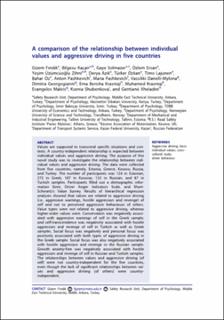A comparison of the relationship between individual values and aggressive driving in five countries
| dc.contributor.author | Fındık, Gizem | |
| dc.contributor.author | Kaçan, Bilgesu | |
| dc.contributor.author | Solmazer, Gaye | |
| dc.contributor.author | Ersan, Özlem | |
| dc.contributor.author | Uzumcuoglu, Yesim | |
| dc.contributor.author | Azık, Derya | |
| dc.contributor.author | Özkan, Türker | |
| dc.contributor.author | Lajunen, Timo Juhani | |
| dc.contributor.author | Öz, Bahar | |
| dc.contributor.author | Pashkevich, Maria | |
| dc.contributor.author | Pashkevich, Anton | |
| dc.contributor.author | Danelli-Mylona, Vassiliki | |
| dc.contributor.author | Georgogianni, Dimitra | |
| dc.contributor.author | Berisha Krasniqi, Ema | |
| dc.contributor.author | Krasniqi, Muhamed | |
| dc.contributor.author | Makris, Evangelos | |
| dc.contributor.author | Shubenkova, Ksenia | |
| dc.contributor.author | Xheladini, Gentianë | |
| dc.date.accessioned | 2021-02-24T13:13:10Z | |
| dc.date.available | 2021-02-24T13:13:10Z | |
| dc.date.created | 2021-02-23T00:42:45Z | |
| dc.date.issued | 2020 | |
| dc.identifier.issn | 1943-9962 | |
| dc.identifier.uri | https://hdl.handle.net/11250/2730138 | |
| dc.description.abstract | Values are supposed to transcend specific situations and contexts. A country-independent relationship is expected between individual values and aggressive driving. The purpose of this novel study was to investigate the relationship between individual values and aggressive driving. The data were collected from five countries, namely, Estonia, Greece, Kosovo, Russia, and Turkey. The number of participants was 124 in Estonian, 272 in Greek, 107 in Kosovar, 132 in Russian, and 87 in Turkish samples. Participants filled out a demographic information form, Driver Anger Indicators Scale, and Short-Schwartz’s Value Survey. Results of hierarchical regression analyses showed that values are related to aggressive driving (i.e., aggressive warnings, hostile aggression and revenge) of self and not to perceived aggressive behaviours of others. Value types were not related to aggressive driving, whereas higher-order values were. Conservation was negatively associated with aggressive warnings of self in the Greek sample, and self-transcendence was negatively associated with hostile aggression and revenge of self in Turkish as well as Greek samples. Social focus was negatively and personal focus was positively associated with both types of aggressive driving in the Greek sample. Social focus was also negatively associated with hostile aggression and revenge in the Russian sample. Growth anxiety-free was negatively associated with hostile aggression and revenge of self in Russian and Turkish samples. The relationships between values and aggressive driving (of self) were not country-independent for the five countries, even though the lack of significant relationships between values and aggressive driving (of others) were country-independent. | en_US |
| dc.language.iso | eng | en_US |
| dc.publisher | Taylor & Francis | en_US |
| dc.title | A comparison of the relationship between individual values and aggressive driving in five countries | en_US |
| dc.type | Peer reviewed | en_US |
| dc.type | Journal article | en_US |
| dc.description.version | acceptedVersion | en_US |
| dc.source.journal | Journal of Transportation Safety and Security (JTSS) | en_US |
| dc.identifier.doi | 10.1080/19439962.2020.1784341 | |
| dc.identifier.cristin | 1892586 | |
| dc.description.localcode | Locked until 3.7.2021 due to copyright restrictions. This is an [Accepted Manuscript] of an article published by Taylor & Francis, available at https://doi.org/10.1080/19439962.2020.1784341 | en_US |
| cristin.ispublished | true | |
| cristin.fulltext | postprint | |
| cristin.qualitycode | 1 |
Tilhørende fil(er)
Denne innførselen finnes i følgende samling(er)
-
Institutt for psykologi [3141]
-
Publikasjoner fra CRIStin - NTNU [38688]
